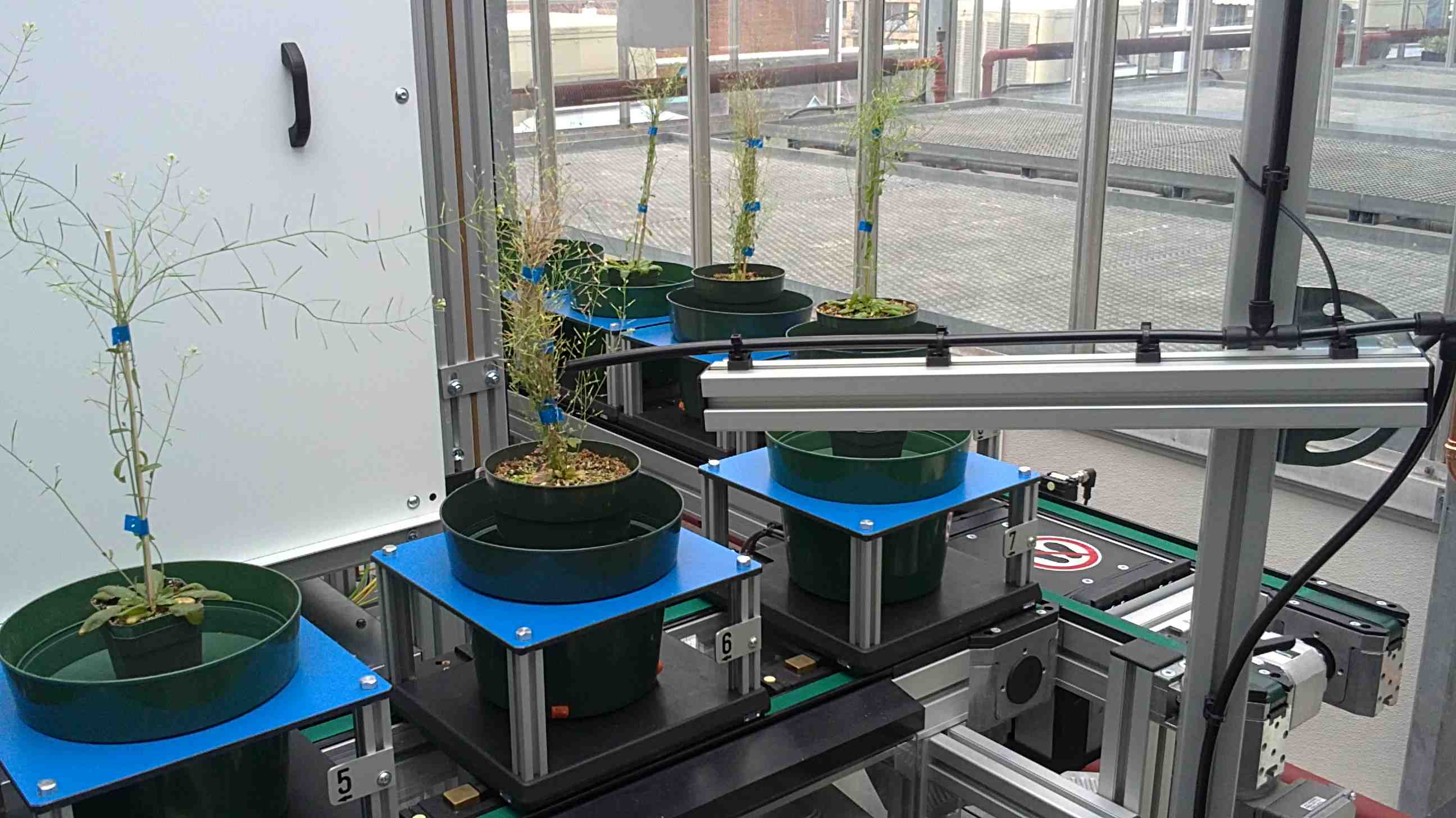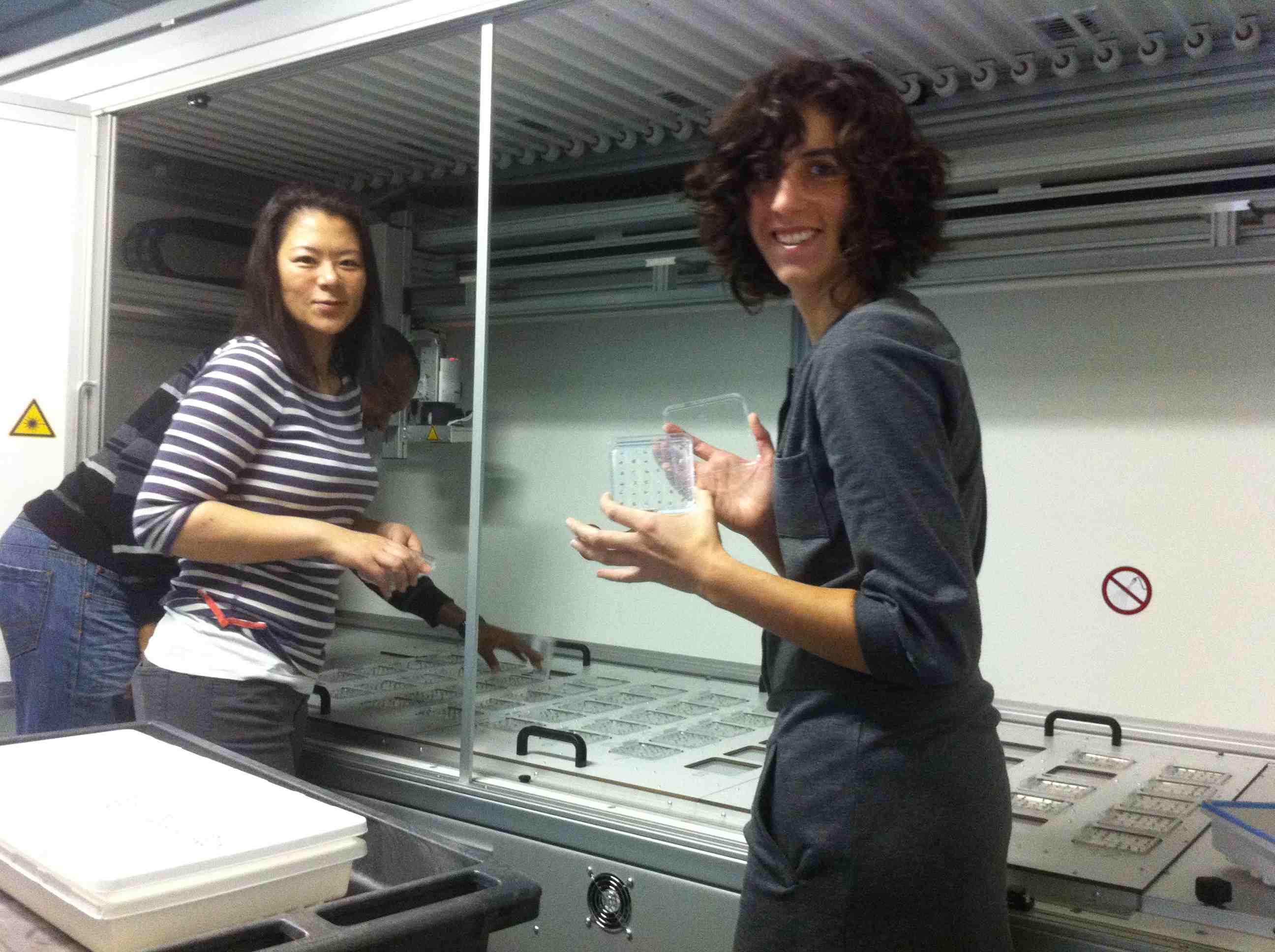
McGill Plant Phenomics Platform in action
 Our lab is interested in identifying non-coding DNA targets underlying
important agricultural traits such as water use efficiency (WUE) and
tolerance to drought and high salt conditions. The addition of the
LemnaTec Scanalyzer HTS and the 3D Scanalyzer to the McGill Plant
Phenomics Platform (MP3) has allowed us to considerably reducing the
time needed to screen and characterize trait-specific phenotypes.
Currently we were be able to screen nearly 20 thousand plants,
representing 125 non-coding DNA targets, a week, and achieving 90%
phenotyping accuracy. The combination of the Scanalyzers and
carefully designed protocols was key to this success.
Our lab is interested in identifying non-coding DNA targets underlying
important agricultural traits such as water use efficiency (WUE) and
tolerance to drought and high salt conditions. The addition of the
LemnaTec Scanalyzer HTS and the 3D Scanalyzer to the McGill Plant
Phenomics Platform (MP3) has allowed us to considerably reducing the
time needed to screen and characterize trait-specific phenotypes.
Currently we were be able to screen nearly 20 thousand plants,
representing 125 non-coding DNA targets, a week, and achieving 90%
phenotyping accuracy. The combination of the Scanalyzers and
carefully designed protocols was key to this success.
 Our Scanalyzer HTS has five integrated sensors, which allow us to measure
different plant characteristics, such as near infrared scanning to
measure the water content of leaves, a fluorescence camera for
chlorophyll content, and RGB scanning to assess plant morphology,
architecture and health. Our 3D Scanalyzer gives us a detailed
assessment of larger plant, allowing us to take snapshots from
multiple angles and to precisely monitor water use.
Our Scanalyzer HTS has five integrated sensors, which allow us to measure
different plant characteristics, such as near infrared scanning to
measure the water content of leaves, a fluorescence camera for
chlorophyll content, and RGB scanning to assess plant morphology,
architecture and health. Our 3D Scanalyzer gives us a detailed
assessment of larger plant, allowing us to take snapshots from
multiple angles and to precisely monitor water use.
 The high integration level and the diversity of its sensors make of this
technology a perfect platform for phenotyping.
The research infrastructure of the Department of Biology continues to
grow. The latest acquisition of the LemnaTec platforms was made
possible by Professor Thomas Bureau
with a CA$2M infrastructure
grant from the Canadian Foundation for Innovation (CFI). This allows
researchers high-throughput measurement of complex phenotypic traits
in plants and is among the most advanced facilities of its kind in
the world. Ongoing operating costs of the MP3 is funded by CFI funds
and a CA$5M Genome Canada/Genome Quebec grant called the
The high integration level and the diversity of its sensors make of this
technology a perfect platform for phenotyping.
The research infrastructure of the Department of Biology continues to
grow. The latest acquisition of the LemnaTec platforms was made
possible by Professor Thomas Bureau
with a CA$2M infrastructure
grant from the Canadian Foundation for Innovation (CFI). This allows
researchers high-throughput measurement of complex phenotypic traits
in plants and is among the most advanced facilities of its kind in
the world. Ongoing operating costs of the MP3 is funded by CFI funds
and a CA$5M Genome Canada/Genome Quebec grant called the
 Value-directed Evolutionary Genomics Initiative (VEGI) represented by
a team of researchers, with expertise in comparative, population and
functional genomics and agricultural economics, and led by Professor
Bureau.
Value-directed Evolutionary Genomics Initiative (VEGI) represented by
a team of researchers, with expertise in comparative, population and
functional genomics and agricultural economics, and led by Professor
Bureau.
Installation of the rooftop systems in downtown Montreal (Quebec, Canada) was extremely challenging and only made possible by the close cooperation between McGill and LemnaTec to coordinate all aspects of the logistics and on-ground support.